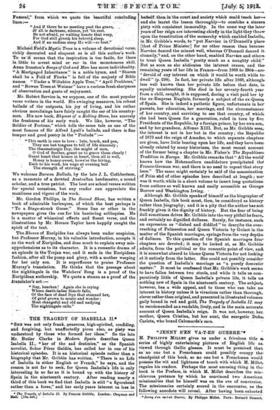• THE TRAGEDY OF ISABELLA II.*
"Sim was not only frank, generous, high-spirited, confiding, and forgiving, but unaffectedly pious also, as piety was understood by those who formed her ideas." So the late Mr. Butler Clarke in Modern Spain describes Queen Isabella II., " her of the sad destinies," as the Spanish novelist, Seam. Perez Galdos, has called her in one of his historical episodes. It is an historical episode rather than a biography that Mr. Gribble has written. "There is no Life of Isabella in either English or French," he says, and the reason_ is not far to seek, for Queen Isabella's life is only interesting in so far as it is bound up with the history of Spain in the nineteenth century. After reading nearly a third of this book we find that Isabella is still "a figurehead rather than a force," and her early years interest us less in • The Tragedy of Isabella IL By Francis Gribble. London: Chapman and heiself thawin the court.hnd society which eould teach her—, and she learnt the lesson thoroughly—to combine a sincere piety with consistent immorality. In the same way the later years of her reign are interesting chiefly in the light they throw• upon the Constitution of the monarchy which enabled Isabella. in Mr. Gribble's words, to " put Narviez in O'Donnell'? place [that of Prime Minister] for no other reason than because Narviez danced the minuet well, whereas O'Donnell danced it clumsily,'1 and, on the other hand, enabled Narviez and others• to treat Queen Isabella " pretty much as a naughty child." But as soon as she abdicates the interest ceases, and the- remaining years of her life in France—from 1868 to 1904—are- " devoid of any interest on which it would be worth while to- dwell" (p.,298). In fact, her private life after 1868, although less well known than her private life before that date, is: equallyuninteresting. She died in her seventy-fourth year from a chill, caught, it is supposed, during a visit paid her by the ex-Empress Eugenie, formerly a subject of the ex-Queen of Spain. She is indeed a pathetic figure, unfortunate in her parents, her education, her marriage, and the circumstances- of her country, and surviving to see that country, of which she had been Queen for a generation, ruled in turn by five: Presidents of the Republic, by a foreign prince, by her own son,. and by her grandson, Alfonso XIII. But, as Mr. Gribble sees,. the interest is not in her but in the country ; the Republic of 1873 and the reign of Amadeo, to which separate chapters are given, have little bearing upon her life, and they have been already related by many historians, the most recent account of the former being a chapter in Mr. Fisher's The Republican. Tradition in Europe. Mr. Gribble remarks that " All the world' knows how the Hohenzollern candidature -precipitated the* Franco-German war, and there is no need to repeat that story here." The same might certainly be said of the assassination of Prim and of other episodes here described at length ; nor was it worthwhile in a short volume to insert long quotation& from authors so well known and easily accessible as George Borrow and Washington Irving.
Although Mr. Gribble speaks of himself as the biographer of Queen Isabella, this book must, then, be considered as history rather than biography; and it is a pity that the author has not frankly given it the dignity of history. But the fear of being- dull sometimes drives Mr. Gribble into the very pitfall he fears,. and certainly no dignified dullness. Surely, for instance, such an expression as "dished and diddled" to describe the over- reaching of Palmerston and Queen Victoria by Guizot in the matter of the Spanish marriages, springs from the very depths. of dullness. To this question of the Spanish marriages feur chapters are devoted ; it may be looked at, as Mr. Gribble- admits, from the political or the romantic point of view, and, it ia somewhat absurd to blame Queen Victoria for not looking- at it entirely from the latter. She could not possibly consider the question of Isabella's marriage as "a purely domestic- matter." It must be confessed that Mr. Gribble's work seems to have fallen between two stools, and while it tells us com- paratively little of Queen Isabella's private life, it tells u& nothing new of Spain in the nineteenth century. The subject* however, has a wide appeal, and to those who can take no interest in history unless it is vivacious rather than thorough, clever rather than original, and presented in illustrated volumes gaily bound in red and gold, The Tragedy of Isabella II. may be recommended as a readable, lively, and in the main accurate account of Queen Isabella's reign. It was. not, however, her mother, Queen Cristina, but her aunt, the energetic Doiial Carlota, who boxed Calomarde's ears.


















































 Previous page
Previous page